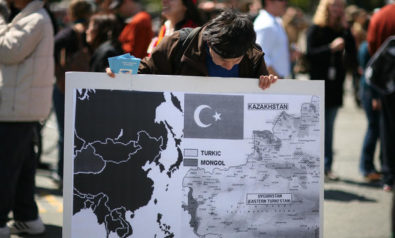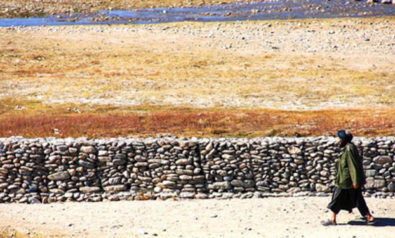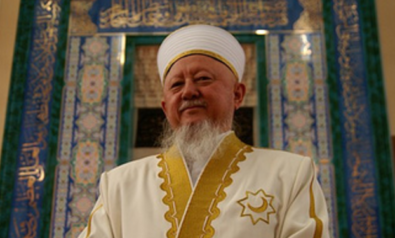The emergence of a multi-polar world order and the decline of neoliberal hegemony make the creation of a new caliphal entity not that unlikely. Even if the where and how of such a development remain largely shrouded in speculation for now, Pakistan is a possibility.
In an editorial published earlier this year, the Russian publicist and Islamic social activist Geidar Jemal suggested that one or another form of a restored caliphate is to be one of the world’s political poles in the not too distant future. For most of international opinion, the idea of restoring the caliphate comes at one with the specter of a terrorist international. In my opinion, one has to start to look beyond this. It’s not political fiction. With socialism dead or sapped and rampant neoliberalism dragging entire societies into disaster, effective resistance and alternatives in the global periphery and even in parts of the old, stagnating centers will not come from classical alter-globalist and other left-leaning movements. They will come from movements based on ideological and organizational frameworks that have both withstood the test of time and are grounded in real society, like traditional solidarity groups ‒ either existing or recomposed ‒ and the world religions.
No caliph ever since
As a reminder, the caliph is the successor to the Prophet Muhammad as the political and ideological leader of the Muslim Ummah, the global community of believers. Initially, as was the case with Abu Bakr, the first of the Prophet’s successors and the three other Rightly-Guided Caliphs who came after him were elected by the believers or at least by their representatives. This period is still seen by many Muslims and Islamic opinion leaders as a period of reference and just rule. Later, and for most of Islamic history, the position of caliph was held by dynasties and was, as such, de facto legitimizing monarchic systems the last of which were the Ottoman sultans. Since the Ottoman caliphate got officially abolished by masonic nationalists in 1924 and the carve-up of most of the Islamic world into national states that long experimented with extraneous ideological and economic systems, the Muslim Ummah has been without a caliph.
The unification of the Islamic sphere either as it exists now or as it was at the medieval zenith of Islam into a single entity under a restored caliph has been either explicitly or implicitly the main cause of many militant Islamic movements. Of course, the idea itself is not unattractive to not a few, for caliphal rule often coincided with periods of economic and political flourishing that stand in stark contrast to the Islamic world’s paradigm over the last centuries. Even though it can exist ideologically and virtually, a semi-global state unifying the entire Muslim Ummah in one single entity is neither practically doable or manageable due to the many fault lines and the sheer enormity of both the physical territories and the populations involved. That being said, it is possible and even probable that we will see the emergence of a state that will maybe not take up the leadership of the whole Muslim Ummah as such, nor necessarily be a universally recognized central religious and political authority, but that will get its legitimacy and esteem through hosting the restored institution of caliph whose influence will likely reach well beyond that state’s political borders.
To many, this may seem improbable at best. But sometimes, one has to dare to go for unconventional and politically incorrect scenarios. Every now and then, they do even materialize. Had someone predicted, say, twenty-five years ago that portions of the USSR and Yugoslavia would be part of the EU today, for instance, or that an Afro-American would be president of the US ‒ not that it makes much different in terms of interests involved ‒ that person would probably have been ridiculed or his or her views at least considered to be extravagant. Similarly, until barely two years ago, hardly anyone could have predicted that Qadhafi would be dead and Mubarak deposed and humiliated by now. But where could ‘it’ happen? The still open outcome of the historical tipping point that the Arab uprising definitely is, leaves plenty of potential answers and possibilities. Yet one possibility that yours truly would like to propose is situated beyond that sphere, more specifically in Pakistan.
The revolutionary matrix
To start with, in a way, to designate Pakistan as the bedrock of a caliphal entity would not be an inadequate and absurd option, since it reflects well that the demographic center of gravity of the Muslim Ummah has long shifted from the Arab world to Asia. There is also something else. Pakistan was initially founded as a homeland for a confessional group and is, as such, an ideological project and not an ethno-national state, an objective capacity it only shares, by the way, with Israel. Like the latter, ever since its founding it was constantly torn between the question whether it is merely an entity where adherents of the confessional group it was founded for can live as a safe majority, or whether it also has to be fully governed according to religious legislation. For what it’s worth, empirical evidence as well as my personal observations on site suggest a high degree of popular identification with Islam more than with the nation-state in Pakistan. According to the survey, its respondent base and the year and way that it was taken, between 49 and 87 percent of respondents in or from Pakistan identify themselves as adherents to the Islamic faith first, and only then as citizens of their country or as members of an ethno-regional group.
Pakistan is also the only Islamic country to possess nuclear weapons which, as we know, is a conditio sine qua non to be taken seriously in global security. This yields the country a certain esteem in public opinion among the popular strata of the Muslim Ummah in general. Of course, these factors are not sufficient to argument the possibility of a caliphate as long as there exists no support base, popular demand or objective conditions for such a revolutionary project in Pakistani society itself. Although there has unfortunately not been more recent research on this, most interestingly, 74 percent of those asked in 2007 were in support of a caliphal form of governance to one or another degree. Of course, this does not necessarily mean that the respondents had a detailed understanding of the concept of the caliphate. Nonetheless, recent data underline that a large majority of Pakistani, more specifically 82 percent, see an alternative and a way for betterment in an Islamic system with laws that strictly follow the Quran. Likewise, about two-thirds of surveyed opinion in 2011 positively assessed the fact that Islam plays a large role in politics and governance or felt it ought to play a larger role.
Emancipation in a different form
Sociological research is not infallible as we know. But at times it indicates or documents something.
The problem though is that for far too long, in Pakistan pretty much like in the Arab world and the former Soviet Eurasia, international salons and opinion makers have taken the lines and wishes of minorities of westernized, secular liberals too much for granted without realizing that there is still a large society beyond them where starkly different realities and perceptions prevail. Secular, liberal democracy, widely perceived in Pakistan to entrench paralyzing ego rivalries and the corruption of the old elite families, is largely discredited. The idea of a system with popular participation, reliable judiciary and accountable leadership, however, is not. Yet, as one young Pakistani blogger suggested, such a system is also perceived to exist beyond Western-shaped democratic institutions, for example in the way of governance under the Rightly-Guided Caliphs. Whether this view is over-idealized and whether it is widespread in Pakistani society or not, is less important than the fact that there exist alternative ways to liberal democracy to realize a profoundly human and perfectly justified longing for a dignified life and a minimum of social justice.
If one looks for alternatives, the question is: an alternative for, or against, what exactly? The Taliban, whether the homegrown branch or the resistance movement next door, are apparently not perceived to be the greatest threat to Pakistan in wider opinion. Even if the rebels seem to have limited active popular support, popular support for the use of the Pakistani armed forces in fighting the Taliban guerrilla in the Federally Administered Tribal Areas and the North West Frontier Province has been equally sharply dwindling over the last three years. People are aware of other, more daily and tangible threats. One could immediately say: ‘a bad economy’. Yes, this indeed preoccupies people a lot. But despite the large influx of foreign aid it is wrong to look at Pakistan merely in terms of poverty and economic downturn, because the country is not poor and not amorphous. The reality is that Pakistan’s potential is enormous, not as the umpteenth cosmopolitan service hub with a hot air economy that is not really one, but in the real, actual economy. Besides having an agro-industry and being a leading producer of cotton and grain, it has considerable energy capacity such as the large coal layers in the Thar desert and the natural gas reserves in the Sui and Makran regions.
Weary with humiliation
Above all, Pakistan, whose population is half that of the US’ and almost one-third of the EU’s, has an industrious, savvy population and diaspora and a lot of economic initiative, much of it out of survivalist necessity, yet it’s there and happening. The country has also a large civil society, part of it faith-inspired, that is active in the social sector. There’s especially a feeling of humiliation and of serious frustration about the draining of the country’s potential because it has been dragged in the war on terror, and because of corruption. The perception that Pakistan, its army and its society bear the brunt in a war on terror that mainly serves foreign, infidel interests is strong and widespread. From 2001 to 2011, Pakistan’s more or less forced participation ‒ the foreign aid lifeline, ‘with us or against us’, and then there’s also the ghost of what happened to Iraq ‒ the so-called war on terror has officially cost the country and society 35,000 civilian lives, 3,500 security personnel and almost 68 billion dollars in war expenses and economic damages. This comes at half the country’s nominal gross domestic product for 2007 and represents capital that can no longer be invested in education, infrastructure and the improvement of key sectors like agriculture.
There’s also the awareness in society that institutionalized corruption, elites that are closer to foreign interests than to their own population base and neo-feudalism entrench poverty, as came to light once more after the floods that struck Pakistan in the summer month of 2010. In Pakistan as elsewhere, change will have to come from groups and institutions that do not only have legitimacy in society but that also find themselves in a position to push through change. While the popularity and esteem for the national civilian government and political parties are close to an all-time low, according to a 2011 poll the public support and confidence rate for the armed forces stand at 79 percent, that of the media at 76 percent and that of religious leaders at 60 percent. Since the media are not an organizational institution, it leaves the military and the religious leaders as the institutional supporters and bearers of an Islamic alternative.
Outcome of a multipolar world
In Pakistan the armed forces are not only the backbone of the state, they are also a key player in various sectors of the economy. It is also the institution that despite many setbacks could prevent, so far, the balkanization of Pakistan that some and their ethnic separatist proxies would like to see happen. Although it is difficult and prone to speculation to estimate the actual support for an Islamic revolutionary project in the armed forces, there is a growing gap between units and between more westernized parts of the top brass and the middle cadres of the army in this regard. A Pakistan that is to be unified, stronger and that gains the position that it deserves, will unavoidably strengthen an identity that is already closely intertwined with the Islamic religion, whether of Sunni and Shia whose population shares in Pakistan almost reflect those of both currents of Islam in the Ummah in general. From there to anchor legitimacy through hosting a restored caliphate is a logical step. Who is to be caliph is difficult to predict. It is not that such an entity would be expansionist at once, yet the potential run of events in neighboring countries might lead to a de facto territorial expansion.
To be clear, it’s not about marching to Srinagar. One has to look westward. When the open and direct international occupation of Afghanistan ends or, at least, phases out in a couple of years, the emergence of a predominantly Pashtun Taliban quasi-state in the country’s southeast is not unthinkable. The space in which this can happen is demographically, ethnically as well as economically already well interconnected with Pakistan. Even if the comparison is somewhat awry, the situation that would arise is not unlike that of the pan-Armenian entity that has been formed from the de facto merging of Armenia and Nagorno-Karabakh. There are also rebel causes in which a caliphal entity might graft its influence, especially if these occur in strategic parts of the Muslim Ummah. One example this author is thinking of is Somali piracy which is in the first place not to be seen in terms of ordinary banditry, but as a reaction against the destruction of Somali fisheries by foreign factory-trawlers. History can, of course, go entirely different ways than suggested here. But in either case, the re-foundation of a caliphal entity will be more an expression of the emerging multi-polar world order rather than a global Islamic takeover.
The views expressed in this article are the author's own and do not necessarily reflect Fair Observer's editorial policy.
Support Fair Observer
We rely on your support for our independence, diversity and quality.
For more than 10 years, Fair Observer has been free, fair and independent. No billionaire owns us, no advertisers control us. We are a reader-supported nonprofit. Unlike many other publications, we keep our content free for readers regardless of where they live or whether they can afford to pay. We have no paywalls and no ads.
In the post-truth era of fake news, echo chambers and filter bubbles, we publish a plurality of perspectives from around the world. Anyone can publish with us, but everyone goes through a rigorous editorial process. So, you get fact-checked, well-reasoned content instead of noise.
We publish 3,000+ voices from 90+ countries. We also conduct education and training programs
on subjects ranging from digital media and journalism to writing and critical thinking. This
doesn’t come cheap. Servers, editors, trainers and web developers cost
money.
Please consider supporting us on a regular basis as a recurring donor or a
sustaining member.
Will you support FO’s journalism?
We rely on your support for our independence, diversity and quality.











Comment